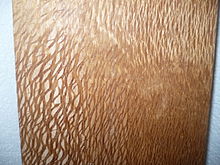Roupala montana
| Roupala montana | |
|---|---|

| |
| Scientific classification | |
| Kingdom: | Plantae |
| Clade: | Tracheophytes |
| Clade: | Angiosperms |
| Clade: | Eudicots |
| Order: | Proteales |
| Family: | Proteaceae |
| Genus: | Roupala |
| Species: | R. montana
|
| Binomial name | |
| Roupala montana | |
| Synonyms | |
| |

Roupala montana is a species of shrub or tree in the family Proteaceae which is native to much of the Neotropics. It is a morphologically variable species with four recognised varieties. The species is used medicinally in Venezuela, and as an aphrodisiac in Trinidad and Tobago and Venezuela.
Description
[edit]The species ranges in size from shrubs to trees, usually 1–8 metres (3–26 ft) tall, but sometimes ranging up to 25 metres (82 ft) tall. The leaves are usually simple in adult plants, but are occasionally compound.[2]: 131 It is an ochlospecies—a species that is highly variable morphologically, and that variability "cannot be satisfactorily accommodated within a formal classification"[3]—with a very wide distribution. Consequently, a large number of species and varieties have been described based on variations between collections.[2]: 142
Taxonomy
[edit]The species was first described by Jean Baptiste Christophore Fusée Aublet in 1775. The name Roupala was based on roupale, a name used locally in French Guiana.[2]: 117 The Latin specific epithet montana refers to mountains or coming from mountains.[4]
In their 2007 monograph, Ghillean Prance, Katie S. Edwards and coauthors recognised four named varieties within the species: R. montana var. montana (the "nominate" variety, based on Aublet's original description of the species), R. montana var. brasiliensis (Klotzsch) K.S.Edwards, R. montana var. impressiuscula (Mez) K.S.Edwards and R. montana var. paraensis (Sleumer) K.S.Edwards.[2]: 131–146
Distribution
[edit]Roupala montana ranges from Mexico in the north, through Central America, to Trinidad and Tobago, and across South America to southern Bolivia, Argentina, Paraguay and southern Brazil.[2]: 132
Uses
[edit]The species is used for fuel wood, high quality charcoal, medicinally and to a limited extent for woodworking and construction,[2]: 135–188 The wood is commonly used for wood turning and sold in small spindles and blocks. Specialist exotic wood suppliers typically refer to this timber as Leopardwood but it can be confused with other species such as Lacewood (Panopsis -P. rubescens and P. sessilifolia).[5] The wood shows strong figuring in quartersawn sections. It turns well and gives a good finish.

It is one of several species including Parinari campestris and Richeria grandis which known by the common name bois bandé. These species are reputed to have aphrodisiac properties.[6]: 105
References
[edit]- ^ Prance, G. (2020). "Roupala montana". IUCN Red List of Threatened Species. 2020: e.T61956965A61956975. doi:10.2305/IUCN.UK.2020-1.RLTS.T61956965A61956975.en. Retrieved 18 December 2022.
- ^ a b c d e f Ghillean T. Prance; Vanessa Plana; Katie S. Edwards & R. Toby Pennington (2007). "Proteaceae". Flora Neotropica. 100 (1): 1–218. JSTOR 4393956.
- ^ Cronk, Q.C.B. (1998). "The Ochlospecies Concept". In C.R. Huxley; J.M. Lock; D.E. Cutler (eds.). Chorology, Taxonomy and Ecology of the Floras of Africa and Madagascar (PDF). Royal Botanical Gardens, Kew. pp. 155–170.
- ^ Archibald William Smith A Gardener's Handbook of Plant Names: Their Meanings and Origins, p. 239, at Google Books
- ^ "Leopardwood | The Wood Database - Lumber Identification (Hardwood)". Retrieved 2020-07-22.
- ^ Winer, Lise (2009). Dictionary of the English/Creole of Trinidad & Tobago: On Historical Principles. Montreal: McGill-Queen's University Press.
